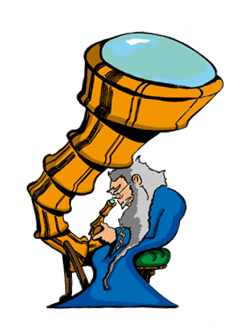 Some of you may remember the column “Ask The Stargazer” that I introduced back in 2011. I posted a couple of replies to your questions since then, but for various reasons the column has lost steam in 2012. But there are still a few unanswered emails in my inbox, so I decided to get “Ask The Stargazer” back into gear again!
Some of you may remember the column “Ask The Stargazer” that I introduced back in 2011. I posted a couple of replies to your questions since then, but for various reasons the column has lost steam in 2012. But there are still a few unanswered emails in my inbox, so I decided to get “Ask The Stargazer” back into gear again!
Here’s the first question for 2013:
Dear Stargazer
I have one more question that I kindly would ask: What is the best fantasy rpg?
Could you please give short overview of the most popular fantasy rpgs with a summary of pros and cons? I have played d&d 3rd, ad&d 2nd, d&d 3.5 and now I’m playing Pathfinder. Although there is a lot of differences between these editions this mostly one game. My problem is that I find this game a bit heavy – having to much rules and the combat takes to much time. In addition I hate class levels, making it too difficult for the DM/GM to make an adventure. So the thing I actually what to find out is what other options do I have? I have played some general rpgs as well, but I didn’t find those very intriguing.
Kind,
Henrik
Deciding which fantasy RPG is best for you is actually not easily answered. There’s no such thing as the best RPG. Every game out there has its flaws and it’s entirely possible that the game I love is total rubbish to you. As the saying goes: One man’s trash is another man’s treasure. But before I get too philosophical, let’s have a look at a few popular games.
A note: I will give you my thoughts on each of the games but going into detail will definitely beyond the scope of a blog post, so if you’re interested to learn more about a particular game, check out the game’s official site or post your question in the comments below.
Pathfinder 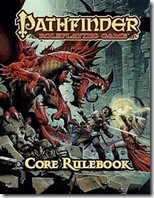 Henrik already mentioned it in his question, and there’s hardly a doubt that Pathfinder is among the more popular fantasy games out there. Pathfinder is basically a derivative of Dungeons & Dragons 3.5 Edition. Back in the day, when Wizards of the Coast announced D&D 4th Edition, Paizo decided not to jump on the bandwagon but develop their own game based on the d20 System. It’s huge advantage is that there’s a lot of material available for Pathfinder – even stuff that was meant for D&D 3.0/3.5 is easily converted to Pathfinder. Another advantage is that a lot of people already know how to play the game, the core concepts are well-known and the basic rules are easily learned. Alas there are also a couple of drawbacks. For one Pathfinder can become pretty complex pretty quickly. The huge number of options, feats, classes, races can cause option paralysis quickly. If you like your games crunchy, Pathfinder may be worth your while, but if you’re looking for something to pick up and play, look elsewhere.
Henrik already mentioned it in his question, and there’s hardly a doubt that Pathfinder is among the more popular fantasy games out there. Pathfinder is basically a derivative of Dungeons & Dragons 3.5 Edition. Back in the day, when Wizards of the Coast announced D&D 4th Edition, Paizo decided not to jump on the bandwagon but develop their own game based on the d20 System. It’s huge advantage is that there’s a lot of material available for Pathfinder – even stuff that was meant for D&D 3.0/3.5 is easily converted to Pathfinder. Another advantage is that a lot of people already know how to play the game, the core concepts are well-known and the basic rules are easily learned. Alas there are also a couple of drawbacks. For one Pathfinder can become pretty complex pretty quickly. The huge number of options, feats, classes, races can cause option paralysis quickly. If you like your games crunchy, Pathfinder may be worth your while, but if you’re looking for something to pick up and play, look elsewhere.
Dragon Age 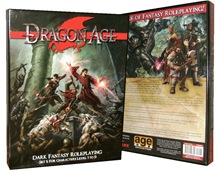 The Dragon Age RPG is based on the computer roleplaying game series of the same name and has become pretty popular over the last years. One thing I love about that particular game is that it’s very newbie friendly. The rules are pretty light and have a certain old-school feel to them. Of course Dragon Age has less options than Pathfinder has and it’s not as easy to run games using Dragon Age in your homebrew campaign. A lot of the rules are pretty closely tied to the Dragon Age setting. Luckily the setting itself is a very cool dark fantasy setting with some interesting twists. If you want to get a quick overview of the RPG and watch some people playing it, check out the latest episode of TableTop on YouTube.
The Dragon Age RPG is based on the computer roleplaying game series of the same name and has become pretty popular over the last years. One thing I love about that particular game is that it’s very newbie friendly. The rules are pretty light and have a certain old-school feel to them. Of course Dragon Age has less options than Pathfinder has and it’s not as easy to run games using Dragon Age in your homebrew campaign. A lot of the rules are pretty closely tied to the Dragon Age setting. Luckily the setting itself is a very cool dark fantasy setting with some interesting twists. If you want to get a quick overview of the RPG and watch some people playing it, check out the latest episode of TableTop on YouTube.
Even though Dragon Age is less complex than Pathfinder it still offers you some interesting options (there’s quite a long list of interesting character backgrounds to chose from) and the Stunt mechanic provides players with cool options during combat without adding too many rules.
Swords & Wizardry
Swords & Wizardry is one of my favorite D&D retro-clones. It’s reasonably close to the first editions of D&D, but introduces a few minor tweaks to make things easier to new players. But that doesn’t mean it cannot be terribly frustrating to certain players. If you are coming from later editions of D&D, you’ll die a lot when playing S&W. Especially during the first few levels running away from enemies is definitely the more sensible option. Swords & Wizardry doesn’t come with a setting, so GMs are expected to create their own or adapt existing settings. This can be a bit daunting for new game masters, but it can also be a lot of fun.
Rules-wise Swords & Wizardry can be considered rules-light, but that doesn’t necessarily mean that it’s that easy to play, especially when you’re used to games where even starting characters are pretty tough. Old-school gaming can be quite lethal.
Dungeons & Dragons 4th Edition 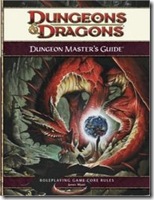 This post wouldn’t be complete without a mention of D&D 4th Edition. D&D 4th Edition is the latest iteration of the Dungeons & Dragons rules. It keeps a lot of the concepts of older editions, like classes, levels, feats, skills etc. but also introduces new ideas like powers. Overall the focus of the game shifted towards tactical combat. This may be a good or a bad thing depending on where your interests lie. Overall the rules for non-combat activities have been streamlined in D&D 4th Edition. In theory combat rules are not that complex either, but the large number of powers player characters have access to, can cause a special form of option paralysis.
This post wouldn’t be complete without a mention of D&D 4th Edition. D&D 4th Edition is the latest iteration of the Dungeons & Dragons rules. It keeps a lot of the concepts of older editions, like classes, levels, feats, skills etc. but also introduces new ideas like powers. Overall the focus of the game shifted towards tactical combat. This may be a good or a bad thing depending on where your interests lie. Overall the rules for non-combat activities have been streamlined in D&D 4th Edition. In theory combat rules are not that complex either, but the large number of powers player characters have access to, can cause a special form of option paralysis.
Production quality of 4th Edition is great, definitely on par with Pathfinder. Wizards of the Coast and third-party publishers have created a huge number of supplements for the game including but not limited to settings, adventures, and new classes. But since the next edition of D&D is already in the works, things are looking a bit gloom for 4th edition.
Tunnels & Trolls 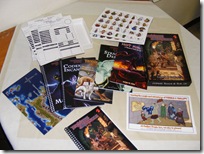 A great alternative to D&D and its derivatives is Tunnels & Trolls. It may look a lot like D&D on the surface, but on a more closer inspection you realize that T&T is actually pretty different. Especially the combat system sets it apart from other fantasy games I’ve played. Each character rolls his weapon damage and adds his “combat adds” (calculated from the character’s attributes). The player’s results are then added and compared to the results of the opponents. The higher result wins and the difference between the two results is the damage that’s dealt to the whole group. The GM usually decides how the damage is distributed. Armor reduces the damage each character gets. The T&T v7.5 Boxed Set is a pretty complete product that comes with a setting, a poster world map, two adventures, and even dice.
A great alternative to D&D and its derivatives is Tunnels & Trolls. It may look a lot like D&D on the surface, but on a more closer inspection you realize that T&T is actually pretty different. Especially the combat system sets it apart from other fantasy games I’ve played. Each character rolls his weapon damage and adds his “combat adds” (calculated from the character’s attributes). The player’s results are then added and compared to the results of the opponents. The higher result wins and the difference between the two results is the damage that’s dealt to the whole group. The GM usually decides how the damage is distributed. Armor reduces the damage each character gets. The T&T v7.5 Boxed Set is a pretty complete product that comes with a setting, a poster world map, two adventures, and even dice.
RuneQuest 6th Edition
RuneQuest is almost as old as D&D and T&T. And even though it has been created in 1978 the system aged pretty well. While especially D&D changed a lot over the years, the system powering RuneQuest is still pretty close to it’s 1st edition. RuneQuest uses a skill-based percentile dice system that you’ll probably know from the famous Call of Cthulhu. RuneQuest is tied closely to the setting of Glorantha (although I am not sure if this is still the case in the 6th edition). This is usually reflect in the magic system and a focus on cults and brotherhoods that play a large role in that setting. An alternative to RQ6 is Legend by Mongoose, which is based on the same rules system, but which was designed as a generic fantasy game. In my opinion RuneQuest feels more grim & gritty than D&D but your mileage may vary.
Conclusion
These six games are only the tip of the iceberg. There are many more interesting fantasy games out there. If you are looking for some cheap (or free) alternatives to the games mentioned above, check out my Gaming On The Cheap series (2009 Edition, 2013 Edition Part I, 2013 Edition Part II). In my opinion it’s impossible to answer which game is actually the best, but there are a lot of games worth your time out there. So, dear reader, what’s your favorite fantasy RPG? Please post your thoughts in the comments below!
P.S.: Even though I still have a few unanswered emails in my inbox, I am still interested in new questions. If you have anything you always wanted to ask me, please send an email to askthestargazer@stargazersworld.com!

Good summary! Of course, even posing this question on your site will lead to many, many diverse comments. 🙂
If you’re looking for something lighter in fantasy, you might want to check out one of the following (in no particular order)
1) Castles & Crusades–a fairly light meeting ground between d20 and AD&D.
2) Basic Fantasy RPG–An RPG the feel of classic D&D, but with some updated conventions to make things smoother.
3) Warrior, Rogue, and Mage–Michael will tell you more. 🙂
4) BareBones Fantasy–my most recent acquisition, and one I’m having an incredible time with–see link:
http://www.rpgblog2.com/2013/01/why-you-should-check-out-barebones.html
Also, if you want a good, enthusiastic version of early D&D that isn’t too complex, there’s also the old 1st Edition Palladium Fantasy RPG. You can usually find a copy on Amazon or somesuch for about $5-6. It’s also on DriveThruRPG/RPGNow
Do you have a link for “Basic Fantasy RPG” ? I don’t see any meaningful results on, say, Drivethru…
http://www.basicfantasy.org/
Thanks!
Good list, I also missed BareBones on there especially as he asked for something with lighter rules. I would sugegst Savage Worlds as well.
Thanks! I focused on the more popular games in this post, mainly because I mentioned games like WR&M and BBF in my “Gaming on the Cheap” series already.
Nice overview… It should be NO surprise I am partial to Pathfinder. I do love my crunch and I am so used to the system I don’t run into all those difficulties people mention. Of course there are tools out there to make life easier.
I love Dragon Age, well theoretically. I’ve read it but never played it.
Swords and Wizardry intrigues me, I long to play it but the majority of my players don’t feel that nostalgia and I think they would balk at the lack of options for characters. Well most of them except one who I think would play it in a heartbeat!
The reason I’ve started to be more interested in OSR games like Swords and Wizardry is… I don’t think it gives you “lack of options”. I think it leaves those options up to your imagination. In that regard, Pathfinder (and all of the incarnations of AD&D) are the ones that give you fewer options — because the options are all pre-set and pre-crafted.
The only things that most “0 edition” retro-clone games lack are:
a) the separation of race/species and class … this one is particularly irksome since it’s only done because “the original edition did it”. There’s no reason to keep that specific element.
b) generic multi-class rules (ie. only certain metahumans multi-class, and they multi-class in a very specific way). And I think that’s tied to “a” above. Get rid of “a”, and you can probably use a simple multi-class mechanic for all species.
Other than that, I’m very much of the opinion that 3.x games are less flexible, not more flexible.
I love Savage Worlds. You can do fantastic fantasy campaigns with it, and it stay playable even with dozens of mooks, and fast even at VERY high “levels”.
Still keeping good details on characters and equip.
You just need the basic book and the fantasy companion (that I don’t like). However you can do some epic fantasy with the super-hero companion and/or the Shaintar book.
Finally, it has nice “new gen”* rules, not the same old variations of d20.
* ehi, it’s not a new wave system like Dungeon World, however I love the rules for chases, mass battles, and all that cool action you can do in combat, even without dozens of feats: tricks, test of will, grapple that work good etc.
Have you ever played Fudge? Savage Worlds sort of strikes me as “the structure of Fudge, but with more specifics … and different dice”.
Sure, Fudge and a lot of versions of Fate, I played.
I still prefer Savage. Fate has lot of parts that seems “incomplete”, or lot of stunts/powers not fully playtested. I did a lot of work to keep my Legend of Anglerre (Fate 3) fantasy campaign going. Also, I tried Strands of Fate (a sort of Gurps-like Fate). Savage has lot of ready-to-use material, equip, powers, feats (edges), etc. and a huge fan support in the forum, for official settings and the numerous unofficial (while quite professional made) conversions… and it works! I love the “shaken” mechanic, I love the mooks rules (they are quite detailed, but you don’t need hours to keep trace of their HPs), I love the initiative made with poker cards (it’s a blast, if you play in big groups!) etc.
However, I like Fate system, and I hope the new Fate Core (aka Fate 4) will bring coherent design AND some good crunch (with lot of stunts etc.). ’till now, the Kickstart is going VERY well, but the beta docs I read dot impressed me so much (i.e. the Core seems good, but they are trying to keep the crunch and the details to bare minimum, I’d like more detail, and I hope in the final version I’ll get what I’m hoping).